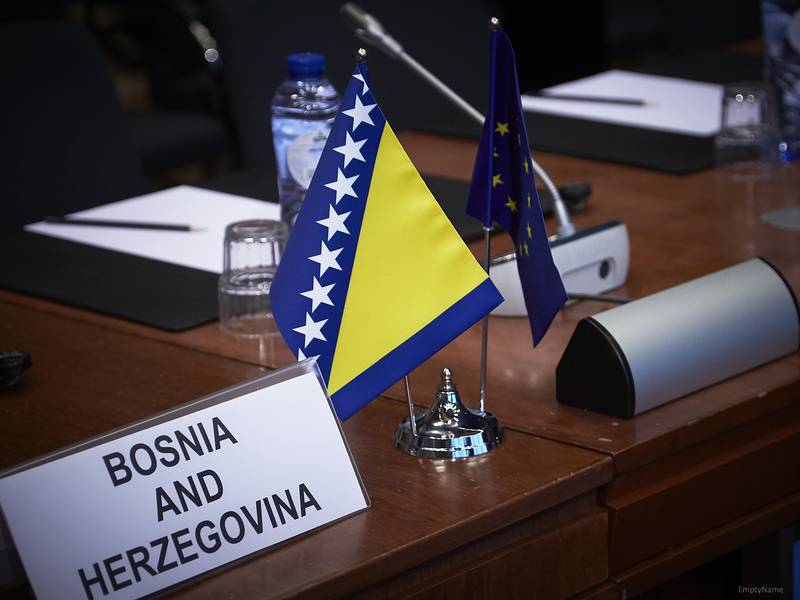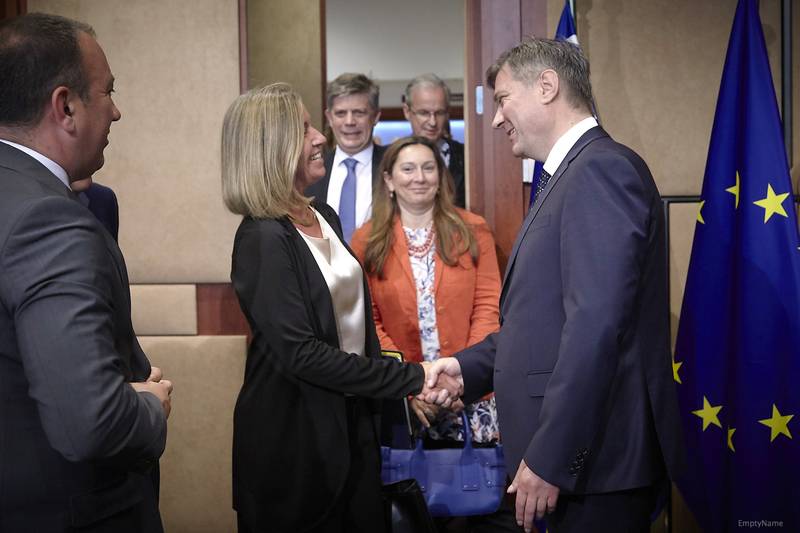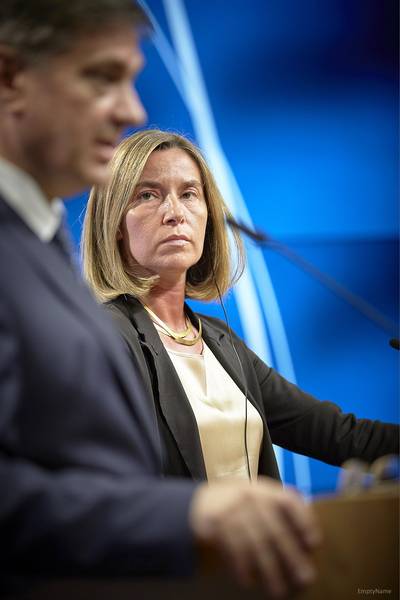EU Expects the Impossible from Bosnia and Herzegovina
Adelina Marini, July 11, 2017
On the eve of the 22nd anniversary of the Srebrenica massacre, with close to zero media interest, the second Stabilisation and Association Council for Bosnia and Herzegovina, with the participation of the EU High Representative for Foreign Policy and Security, Federica Mogherini, Bosnia and Herzegovina Prime Minister Denis Zvizdić, and several ministers took place. Mogherini and Zvizdić marked great progress, embodied in BiH's application for membership filed last year, the positive response from the Council, and the sending of the mandatory questionnaire from the European Commission, finally setting up, after long years of bickering, of a coordination mechanism on European issues. Progress was also noted in the work on the reform agenda.

The EU expects reforms, BiH in turn – a candidate state status
"A lot has been done and achieved", was Ms Mogherini's assessment, according to which, ultimately EU accession means precisely that - reforms and, in particular, transformation in the economy, the rule of law and public administration. The EU expects BiH to approve the excise package, prepare common strategies for energy, agriculture and employment. It is also expected that a transport agreement will be signed at the 4th Berlin Process summit in Trieste on 12 July. "The focus has to remain on the reform agenda - both on economy and also on the rule of law", said Federica Mogherini and announced that an agreement was reached during the Council that "more and faster" is to be the guiding principle for both sides.
In the joint statement after the meeting, there is also concern that BiH is affected by "the phenomenon of foreign terrorist fighters and radicalisation". The EU expects the country's authorities to take further measures, in particular towards preventing and combating radicalisation. This year's Europol report states that the conflict in Syria has a huge resonance in Albania, BiH, Kosovo, Macedonia and Serbia. More than 800 foreign terrorist fighters from countries of the Western Balkans have travelled to Syria to join the armed conflict. In some parts of the Western Balkans, radical Islamist ideology is being preached, especially in BiH, the Sandžak region, Albanian-populated territories in Serbia and Macedonia, Kosovo and Albania, the report says.
Prime Minister Zvizdić reported to the almost empty press room in Brussels that much has been done between the last Stabilisation and Association Council (December 2015). No single departure from BiH into military zones has been recorded in the last 16 months, and no departure or return has been reported since the start of the year. Denis Zvizdić expressed his expectation that at the next meeting of the BiH-EU Stabilisation and Association Council next year the country will have candidate status. The problem, however, is that BiH is facing serious obstructions, which is why some processes are delayed, including the preparation of the answers to the European Commission's questionnaire, which is an unavoidable condition for obtaining a candidate status.

The questionnaire is an instrument by which the Commission assesses the country's readiness to move forward on the European integration path. The questions assess the legal base, the institutional and economic situation of the country. Normally, the deadline for completing the questionnaire is 3 months, but in the case of BiH half a year has elapsed since it was dispatched. According to Mr Zvizdić, BiH often faces obstacles along its European path, placed by those "who are not sufficiently dedicated to European integration or are dedicated to European integration only in words". He said, however, that these problems are being solved with the help of European institutions.
Hidden under apparent normalcy
If one sees the press conference and reads the joint statement, one will say that this is just another candidate state, which has to do its homework and has no right to ask for anything until it has done so. This, however, is about BiH, which was torn apart by bloody war and genocide. Peace was achieved with effort by the signing of the Dayton Peace Agreement, which is at the heart of the functioning of the state to this day, but it is less and less able to withstand the geopolitical pressures and the return of nationalist rhetoric of the early 1990s. In the past two years, many in the country have estimated the situation is just as severe as on the eve of the war, if not worse. The reason for that are those, who pose obstacles to BiH's European path, whom Denis Zvizdić chose, however, not to name and nobody asked who they were.
On the other hand, a question was asked by a journalist who presented himself in a way that also shows very well what is not right under the surface in BiH: "[...] the surprisingly still existing Bosnian state television". He asked who was to blame for the current situation where today (11 July) marks another anniversary of the Srebrenica massacre, while at the same time in Banja Luka (in the BiH Serb entity), a procession will be held in support of Ratko Mladic, an accused war criminal. The journalist reminded Federica Mogherini that "your American friends at least partially solved the dilemma by putting [Milorad] Dodik on a blacklist".
The European foreign minister said she was not interested in placing blame. She admitted that Srebrenica is the deepest scar on Europe's skin. "I feel a moral responsibility and a political duty not so much to put the blame on someone but to find ways and paths for cooperation and reconciliation". She added that last time she spoke with Dodik he assured her of his determination to be constructive. "I expect his actions to be at the level of his words", she concluded. Too naive an expectation, especially given that during her first major tour of the Western Balkans at the beginning of the year, Federica Mogherini herself admitted that she had encountered a surprising to her (and the EU) dangerous reality in the region.
The once a year meetings of the Stabilisation and Association Council are far from sufficient to solve the problems that BiH has, and the hopes and expectations for the EU are great, as Denis Zvizdić said, emphasising several times that the EU is the only and greatest goal of the country. Moreover, he referred to Federica Mogherini as the biggest stimulus for the development of European processes in BiH. In order for BiH to cope with the "more and faster" Zvizdić and Mogherini agreed the EU needs to commit itself much more seriously and stop relying on BiH to deal with the tasks itself. It is high time for BiH to enter as a mandatory "subject" in the accession “curriculum” in the same way as the Belgrade-Priština dialogue entered as a separate chapter in Serbia's negotiating process.
BiH, Serbia, Croatia and the EU should be involved in this dialogue, which are to guarantee (not just in words) that the implementation of the reform agenda will be worked upon within the set deadlines and that they truly support BiH's European path. This may seem like an unnecessary exercise, but given Russia's increasingly nervous behaviour in the region, after losing Montenegro and Macedonia, it is very important that the EU takes things into its own hands. One can judge about Moscow's nervousness by its behaviour after an interview by Serbian Prime Minister Ana Brnabić for Bloomberg. As a headline of their article, Bloomberg chose: "Serbia will choose EU over Russia if forced".
Later, Ana Brnabić met the Russian Ambassador to Belgrade Alexander Chepurin and handed him a shorthand copy of the interview, assuring him that her words were misinterpreted by the US media. We learned about that from the Russian propaganda channel Sputnik, which quoted the spokesperson of the Russian Foreign Ministry stating that Ana Brnabić did not mean that. euinside tried to get a transcript or a recording of the interview, but so far we have no answer from either Bloomberg or the Belgrade government press centre. Deputy Prime Minister Zorana Mihajlović, however, stated that she would prefer for ministers to receive the transcript first, instead of the Russian ambassador. The interview has prompted many-day debates in Serbian public domain.

This is just one episode of the pressure Serbia faces and which will not be softened by the change in the country's government. Serbia has very close ties with the leadership of the Serb entity in Bosnia and Herzegovina. President Milorad Dodik is a frequent guest of the most important political events in Belgrade. He was also a special guest on the announcement of Aleksandar Vučić’s election victory in the presidential election in April and was presented almost as a relative. It is precisely because of this that the (European) future of BiH must be part of Serbia's negotiating process, but with the mandatory participation of Croatia as well, which also has an impact on the domestic policy of the Dayton state.
On 7 July in Sarajevo, the first joint meeting of the BiH and Croatian governments since Andrei Plenković became Croatia's prime minister took place. The ambition is for these joint sessions to become common practise in order to resolve bilateral open issues. Currently, Croatia is the strongest voice in the EU in support of BiH's European integration, but it is quite often biased and party-coloured. It is therefore necessary for this trilogue to take place with the facilitation of the High Representative. This will help avoid having her, and hence the EU, being surprised every time they face the situation on the ground. It is time for the EU to stop expecting the impossible from BiH allowing other factors to determine its destiny and instead engage in creating the necessary environment for achieving what is possible.
The Union keeps hopes high for the Trieste summit on 12 July when the “Berlin+” plan is expected to be officially presented, but it should not be forgotten that some problems cannot be solved by money, although it is true that money does help.
Translated by Stanimir Stoev
 Bakir Izetbegovic, Andrej Plenkovic | © Council of the EU
Bakir Izetbegovic, Andrej Plenkovic | © Council of the EU Aleksandar Vucic, Recep Tayyip Erdogan | © Serbian Presidency
Aleksandar Vucic, Recep Tayyip Erdogan | © Serbian Presidency Jean-Claude Juncker, Zoran Zaev | © European Commission
Jean-Claude Juncker, Zoran Zaev | © European Commission